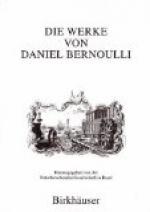|
This section contains 341 words (approx. 2 pages at 300 words per page) |
Encyclopedia of World Biography on Daniel Bernoulli
The Swiss mathematician and physicist Daniel Bernoulli (1700-1782) is best known for his work on hydrodynamics, but he also did pioneering work on the kinetic theory of gases.
Daniel Bernoulli was born on Jan. 29, 1700, in Gröningen, Netherlands. He was the second son of Jean Bernoulli, a noted mathematician who began the use of "g" for the acceleration of gravity.
When Daniel was 11, he became the pupil of his 16-year-old brother, Nicholas. He continued his studies in Italy until he was 24 and received a doctorate in medicine. The following year he went to St. Petersburg, Russia, as a professor of mathematics. After 8 years he returned to Switzerland because of his health. He first taught anatomy and botany, then changed to experimental and speculative philosophy (or, in modern terminology, theoretical physics). He has been called the father of mathematical physics.
In 1738 Bernoulli published Hydrodynamica. In this treatise, which was far in advance of his time in many ways, is his famous equation governing the flow of fluids in terms of speed, pressure, and potential energy, upon which much modern technology is based, especially aerodynamics. Being interested in practical application as well as in theory, he devised a number of experiments which demonstrated the effects he predicted.
In this treatise is also found his remarkable treatment of gas pressure. Considering an enclosed gas as a swarm of moving particles in dynamic equilibrium, he derived the correct expression for the resulting pressure, thus anticipating the approach adopted about 100 years later.
Bernoulli won or shared 10 prizes of the Paris Academy of Sciences, a feat equaled by only one other person, his friend and rival Leonhard Euler. Because of a difference of opinion with Euler, Bernoulli became interested in sound phenomena and discovered that a closed organ pipe can produce only odd harmonics and that pressure determines the relative amplitudes of the harmonics. His last work involved the application of probability theory to various practical matters, such as inoculation and relative proportion of male and female births. He died in Basel on March 17, 1782.
|
This section contains 341 words (approx. 2 pages at 300 words per page) |


